In the fields of south Texas Mexican women work long hours in dangerous conditions under the ever-present threat of deportation
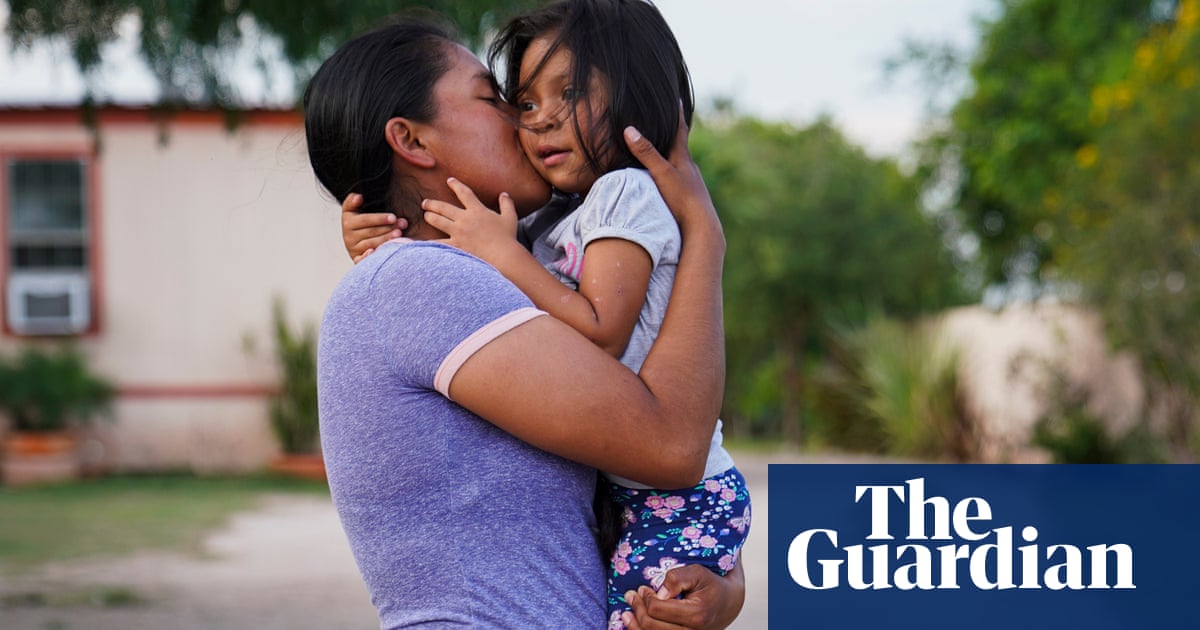
On a rainy, pre-dawn Monday morning in the fields of the Rio Grande Valley along the Mexican border in south Texas, little constellations of flashlights twinkle across the green expanse. They are held by undocumented immigrants, mostly from Mexico, and mostly living in fear of arrest and deportation but working all the same to provide for their families. Their fingers twist the tie on bunches of parsley or hack stalks of kale until their palms blister. Most of Texas is still asleep.
Many of them are paid on a contract basis, by the box. A box of cilantro will earn a worker $3; experienced farmworkers say they can fill one within an hour, which means a typical 5am to 6pm work day would earn them $39 total. The work can vary from physically uncomfortable and mundane (cilantro, lettuce, beets) to outright painful and dangerous (watermelon, parsley, grapefruit).
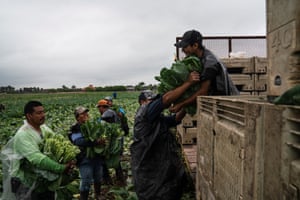
The few women who work in the fields face even more hardships. Instances of workplace sexual harassment and rape are rampant and are both underreported and under-prosecuted. It is common for women to relent to a supervisors advances because she cant risk losing her job or deportation. Most of these women are supporting children as well.
In the fields of south Texas, those women represent a diverse cross-section of lives upturned by drug-related and domestic violence in Mexico. Under new US immigration protocols, these are extraordinarily tense times for immigrants being caught by officials could mean being sent back or having your kids placed in a cage. And yet the women included in this piece refused to hide their faces or change their names.
They want their stories told.
Janet, 36
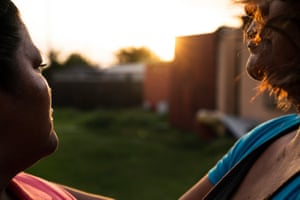
I think I work equally as fast as the men, Janet Castro says, bending over and slicing the roots from the greens of the cilantro harvest. A 36-year-old veteran of fieldwork (she has been picking produce since she was 17), Castro is able to hold a conversation without stopping the swift movement of her knife. A bandanna covers her nose and mouth to keep the headache-inducing cilantro smell out; otherwise the headache lasts for hours after shes left the field.
Parsley is worse: There is a milk in the stems of the parsley that gets on us when we cut it, she explains. As a result, one day in the fields cutting parsley can mean two weeks of itchy, stinging skin that is rough to the touch. We cant wear gloves because the boss says a piece of the glove could get into the product, she explains, and long sleeves would only press the milk into the skin.
Im used to it, she shrugs, in her stoic way, as she scratches her scaly arm.
Janet has worked with the same supervisor for nine years. She describes him as a good guy who has even lent her $200 when she needed it. Despite bending over for most of the day, she says she doesnt experience the same back pain that other farmworkers do. Im really fast at the onion, but there are some men who say I am taking their work. The response I have is that this work is for my kids.
Janet met her husband the first year she started working in the fields. Back at home, they have three children, each with developmental problems; one, the middle daughter, has autism and needs a part-time caretaker. Her older son has suffered epileptic seizures since he was a baby, and the youngest is starting to show developmental issues as well. Janet says her doctors believe the source of her childrens problems are the chemicals used in the fields, but her undocumented status led her to never seek legal action. Plus, she didnt want to lose her job.
Her solace is the Catholic church, and on her one day off Sunday she takes her family there. Afterwards they rush home, to avoid any potential run-ins with immigration authorities. She says she has heard rumors of immigration stings at parties and gatherings after church, and though she says she does not live in fear, she still says she doesnt like to take that risk.
She hopes that someday she might be able to call herself an American citizen. I just hope there is a way for us to get documents, because some of us are really working here. Others are lazy and stay home, but Im really working hard, she says before putting her youngest to bed, seven hours before shell need to arrive at the parsley field the next morning.
Edith, 55
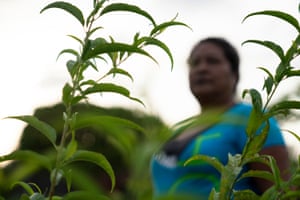
Edith is Janets mom, though her outspoken manner contrasts sharply with her daughters low-key, reticent demeanor. If Edith comes off as strong-headed, she says that her life has demanded it.
Edith worked as a paramedic in Mexico, but she could barely make ends meet. I lived in total poverty in Mexico, she says, her eyes moistening. My home was just a wood shack and when it rained we would get wet. I came here because this is a country of opportunity.
Today she lives with her daughter Janet and her daughters family, but years ago their lives were turned upside down, shortly after Edith came across the Rio Grande River in the early 1990s alone in an inner tube at night.
Four months after Edith arrived and found work as a housekeeper for a local singer, she voyaged back to Veracruz, Mexico, to bring her three teenage children across the border. Janet and her sister, both teenagers then, found work as housekeepers as well, but were getting harassed by men as they walked home from their jobs. One day, Janets sister accepted a ride home and disappeared. Her brother, Ediths son, found his sister after weeks of searching in an apartment building in another town. It appeared that she and another girl had been being held there against their will and abused. Ediths son went to the police to report the crime, and Edith says the abductors were jailed for a week, her son was also punished: he was deported. The investigator just told me to call if my daughter got abducted again, Edith recalls with disgust, and thats when I decided to move towns.
Starting over, Edith threw herself into work in the fields. I dont mind the hard work, she says, I came to this country to fight. Over her two decades of work in the fields, Edith has earned herself a reputation among the men as a tough chingona a badass woman. Once, while working the watermelon fields where rattlesnakes are notorious, Edith used her paramedic skills to save the life of a worker who was bitten by a snake: I put my mouth to it [his leg] and sucked out the venom and spit it out. Such bravery has turned her into a kind of mentor to other women working in the fields.
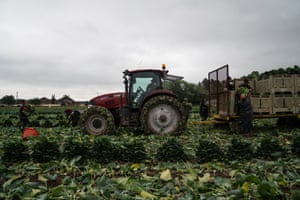
She also informally counsels other female farmworkers against relenting to the pressure of men soliciting sex in exchange for better working conditions. I always tell them, We have worked hard to be here, now dont let yourself down. She says she still sees young women taken off by the supervisors to corners of the fields, but she has hope: People know their rights a lot better now than they used to.
Commonplace labor issues such as intimidation, refusal of collective bargaining rights, wage withholding or unpaid overtime work are also tremendous hurdles that they have few recourses to fight.
A report by Human Rights Watch notes that although US law entitles undocumented workers to workplace protections, the US governments interest in protecting unauthorized workers from abuse conflicts with its interest in deporting them. That report was written in 2015, but President Trumps heightened drive for deportation and border closure has only made things more impossible for undocumented farmworkers attempting to protect their labor rights.
Thats part of why Edith still considers giving up everything and returning with her family to Mexico.
When youre illegal here, its like youre in prison. If you need help, theres nowhere to go.
Mara Rebecca, 23
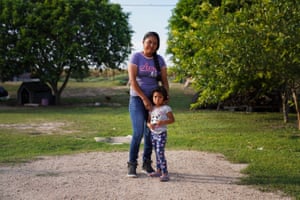
Mara Rebecca came to the US when she was pregnant with her second child three years ago, leaving her older son with her parents back in Michoacn.
My mom spent her whole life working in the fields [in Mexico], and the only reason she stopped was because one of the veins in her eye popped while she was working.
Her sister and her dad are still back in Michoacn working the fields, and it was her other sister who called her to Texas, where she had already moved to.
My sister knew that I loved working in the fields, and she told me I could make a lot more money here. Back in Mexico she would make about $30 a week. Here, she could make $200 a week if, that is, she was willing to take on the most dangerous types of work harvesting in the orchards. She was: farm work is Mara Rebeccas life.
I started working in the fields when I was eight years old. I saw that the rest of the kids were buying lollipops after school, but we didnt have enough money for me to buy them, so I decided to work.
She says that while still in elementary school, she quit attending five days a week so that she could work a few days a week and earn a little spending money. What kept her in school was the free lunch on those days; at home, meals were more irregular, she says with a shrug, as she swings on a bench beneath a pecan tree in her sisters front yard. Her daughter sits quietly beside her, wide-eyed with her little feet barely dangling off the bench.
Throughout middle school Mara Rebecca says she continued working in the fields, priding herself on making enough money to buy instant noodles for lunch. By ninth grade, she dropped out of school completely and turned to farm work full time, but she does not speak about it with much regret. While some kids feel pride by excelling in school or sports, Mara Rebecca felt pride in excelling at farm work. She recounts her working experiences like a more privileged person might recount their travel adventures. I remember working the strawberry fields and having to walk up the side of a hill barefoot because it was too muddy to wear boots. The owners kept the water running to keep the strawberries fresh, but we would slip and fall all the time, she says with a laugh.
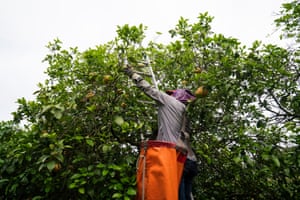
Despite the harsh work conditions she endured in Mexico, she says fieldwork in the US is even more demanding because her wage is not paid hourly ie consistent regardless of how hard she works but rather by the box. Here we are paid by weight, so you have to work very fast. Here it is a lot harder.
The Rio Grande Valley is famous for its winter citrus season, when small-town citrus festivals feature delicious local oranges and grapefruit. Early one morning during this years harvest, Mara Rebecca is already up on a ladder, reaching precariously for each fruit, to drop down into her giant canvas bag.
The physicality of orchard work is astonishingly difficult and dangerous. She leans a ladder slippery with dew and rain against a tree, where it catches hopefully tightly on the branches. Then she makes her way up the 14-foot ladder, all the way to the top, to the last rung. Along the way, she is stretching to reach grapefruit, and tugging at them to get them to release and fall. Any that hit the ground cant be used, so she collects them all in a bag that is slung crossbody and hanging on one side of her hip. The bag weighs anywhere between 60 to 80lb when full of fruit. One missed step on the ladder, or a lean too far to the side, and shell fall.
Thats already happened to her twice this year. Once, her foot slipped off the ladder step during a rainstorm, jerking her balance backwards and sending her to the ground, the bag landing on top of her. On her way down, she slammed the back of her head against the corner of a tractor trailer. She describes experiencing concussion syndromes (though she says she has never heard the word concussion). A doctors visit was out of the question. Without papers, I just try to not cause any problems, she explains, twisting her mouth to the side and looking down to brush dirt off her daughters jeans. She was also unaware of her legal rights in seeking compensation for her injury.
Still, Mara Rebecca is afraid that the work could one day hurt her badly enough to put her children at risk. After her day in the orchard, she dotes on her three-year-old daughter, whose black hair she carefully combs back and secures with tiny barrettes. She lives in her sisters nice mobile home, and maintains a tidy and stable routine for her child (her sister sells Tupperware from the back of a car).
I cant imagine not working in the fields, she says. I always want to keep working, because I never want a man to be able to control me and ask me how I spent his money. But I think I am going to leave this work. I fell again last week. I think I want to go to Mexico.
Blanca, 36
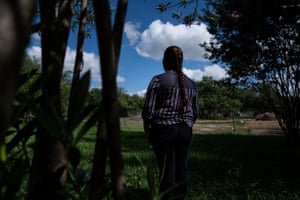
Blanca first entered the US more than a decade ago by simply walking across one of the bridges that link Mexico to the Rio Grande Valley, she says, a bit nervously, since things are different now. Now to get here you have to pay she says, though she leaves unclear whether she means paying the coyotes who traffic people across the border or paying with your life, as many migrants do.
When she first came to the US, she found her work options frustrating. I know how to do pedicures really well, I am really skilled at it actually. But I cant do that kind of work here, because I dont have papers. So she went back to Mexico, taking her family with her.
But life was not much easier in Tamaulipas state, especially after her husband left two years ago to look for better-paying work back in the US. He found it in the fields, and when we first meet and sit in a car to speak, he kneels just out of earshot in the dirt, pulling beets while keeping a wary eye on her. She asked her husbands permission before agreeing to be interviewed.
Blanca says that during the time that he was gone, leaving her behind in Mexico to raise their five kids, she started to feel scared for her safety. We lived in a nice place in Mexico, but I lived in a rancho with very few people around, so anytime a man showed up at the house, I was frightened. Plus, with a house full of teenagers her five children range from 20 to three she started to worry about their future. Theres a lot of crime, and I didnt want my sons working for those thugs. I wanted them working for good. Five months ago, she finally packed up the children to join him. She avoids the question of how they crossed this time.
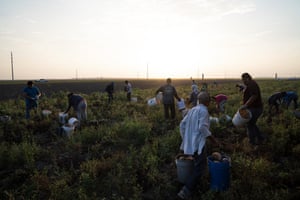
Like her husband, Blanca has taken on fieldwork, even though she does not think she is well-suited to it. Its harder for women to work the fields. Some can, but Im just not used to it. She still hasnt experienced a summer of working in the fields of south Texas, but she is already dreading the heat. When we walk in the sun it is so bad. But also, when it rains its bad too, because your legs get exhausted from walking in the mud. And lifting the onions its really heavy. She tried working the citrus trees like Mara Rebecca but says she quit because it was too hard.
Still, she says she wouldnt trade fieldwork for life back in Mexico. I love that here, the kids can go to a good school and that we can find work, she says. I dont think I will ever go back to Mexico only if I am forced. She says that she still lives with a high degree of uncertainty: I rent my house, so we could get kicked out, she explains, as she gestures around the broken-down trailer home her children are chasing fly-covered puppies out front of. Its hard to live this way because you could go to work and just not come back because the immigration officials showed up.
Trump says he doesnt want immigrants here, and I think its obvious he just hates immigrants. But my question is, why dont you want us if we work so hard?
Shannon Sims is a fellow of the International Womens Media Foundation and a recipient of the Howard G Buffett Fund for Women Journalists
Read more: https://www.theguardian.com/us-news/2019/jul/10/undocumented-women-farm-workers-texas-mexican


Recent Comments